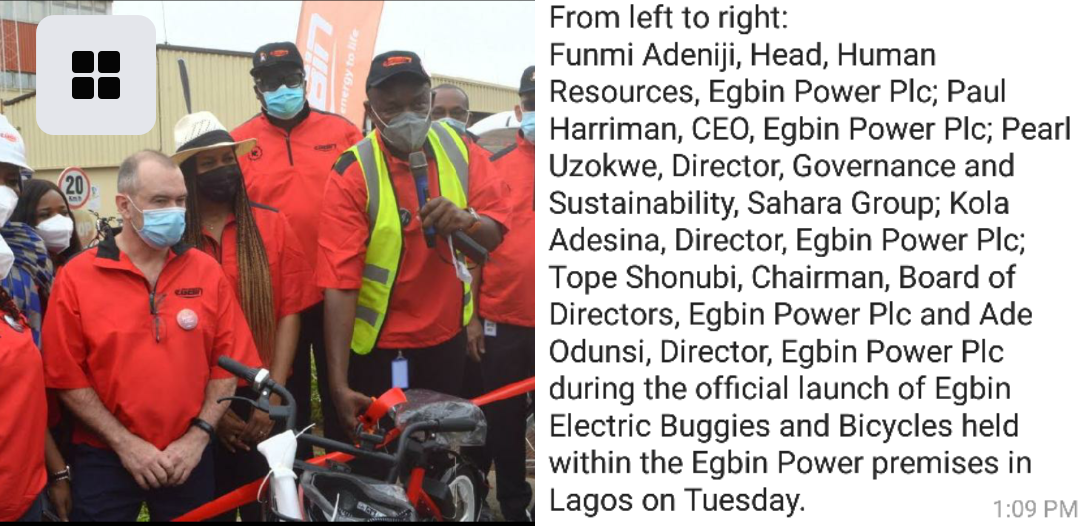
The management of Egbin Power Plc has reiterated its commitment to promote environmental sustainability for the benefit of future generations.
Mr Temitope Shonubi, Chairman, Board of Directors, Egbin Power Plc, made the commitment during the launching and inauguration of electric buggies and bicycles at the electricity generation company’s complex at Ijede in Ikorodu area of Lagos State.
Shonubi said the 20 buggies and 500 bicycles would be deployed for usage by staff members within the facility as a way of reducing carbon emissions and protecting the environment.
According to him, “For us at Sahara Group and Egbin Power Plc, which is one of our subsidiaries, what we are doing today is to ensure that our environment is sustained. We are performing a duty to make sure that the lives of the future generation will be better. We are playing our part because the environment is king.”
He said the Genco is being ambidextrous in its approach to the future and laying a foundation Nigeria can build on. Shonubi noted that electric car manufacturers, Tesla is one of the most valuable companies in the world presently ahead of international oil companies.
“Everywhere in the world, people are talking about electric cars and we are not going to be left behind. The government is already looking at alternatives to powering vehicles in Nigeria due to the huge cost of petrol subsidy. The government is looking at autogas and we believe that with time this will also be promoted,” he said.
Shonubi said the plant was currently generating about 860MW of electricity, adding that only about 500MW was currently being evacuated by the Transmission Company of Nigeria (TCN).
Meanwhile, Mr Kola Adesina, Chairman, Ikeja Electric (IE), says the electricity Distribution Company (DisCo) has signed a N11.4 billion contract to accelerate metering of its customers.
“We have signed service contracts with all our customers and we will ensure that we provide supply to them. We are investing massively in network expansion and also given out additional contracts out for those who will do meters for us. We signed N11.4 billion contract for the purpose of metering our customers,” he said.
He said IE had earlier invested $44 million in advanced metering infrastructure to increase technology and innovation into its business operations.
On the performance of the power sector since the privatisation process in 2013, Adesina maintained that significant progress has been made but there was a lot of ground yet to be covered.
“The kind of improvement we have made is not one we are happy about. It is not what we want to celebrate but we have made significant improvement. We were doing about 3, 000MW in 2013 but today we are doing about 5, 700MW averagely.
“A lot of generating and distribution aspects were way behind but now we are moving forward but we are not moving as fast as we should. We should actually leapfrog achievements than this incremental achievement we are making.
“The reason why that is so is because the economic analysis of electricity is not done using economic principles that it requires. The people living in Ogudu, Magodo, Ikeja and other areas where we have bilateral power supply agreements will tell you that things have improved with the quality of supply they are getting,” he said.
Adesina noted that the Nigerian Electricity Supply Industry was heading towards corrective pricing which would provide incentive for investments.
“As we speak today, we made our own investment based on patriotism, based on nationalism, based on the fact that we are Nigerians, based on the fact that we believe that we had the capacity to bringing energy to life in Africa.
“The commercial principle of the sector needs to change and government has realise that the resources available to the state cannot meet all its expenses. Some of these commodities need to be economically priced. Pricing electricity economically is a commonsensical thing that any administration will naturally want to support.
“Nigeria is doing about 5, 700MW. That is very shameful if you ask me for almost 200 million people. Like I said at a forum yesterday, Nigeria should be doing about 50,000MW of electricity every day,” he said.
According to him, the media and stakeholders need to portray the right narrative regarding how the sector can be revamped.
“We on our part should ensure that the framework to deliver that power is available and ultimately for the consumer to pay the right price, “Adesina added.












